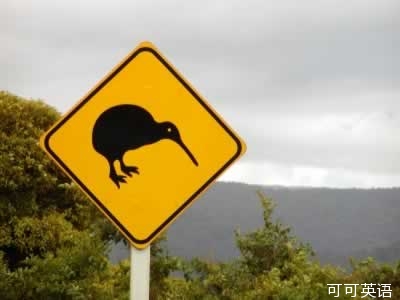(单词翻译:单击)
情景对话
Todd: OK, Leonard, now, when most people think of Kiwi, at least Americans, we think of the fruit.
托德:里昂纳多,大部分人,至少是大部分美国人在说到Kiwi这个词的时候认为是奇异果。
Leo: Right, right. Also in Japan as well.
里奥:没错,的确是这样。当然日本也是这样。
Todd: Oh, really! OK. But, uh, people from New Zealand are called Kiwis not because of the fruit I take it.
托德:哦,真的吗!但是,新西兰人所称的Kiwis并不是我认为的那种水果。
Leo: That's right. That's right. The nickname for New Zealanders is Kiwi, and actually the Kiwi bird... Kiwi is actually a Maori name, and Maori are the native people of New Zealand.
里奥:没错,没错。新西兰的代名词就是几维鸟……几维是毛利语,毛利是新西兰的原住民。
Todd: Oh, wow!
托德:哦,哇!
Leo: And so Kiwi, the pronunciation of Kiwi K-I-W-I KEE-WEE, Maori has similar pronunciation to the Japanese language, ah, ee, uu, eh, oh. They pronounce the vowels.
里奥:所以几维鸟,发音是K-I-W-I KEE-WEE,毛利语的发音和日语的发音很相似,ah, ee, uu, eh, oh。他们的元音也是这种发音。
Todd: OK. I'm..what is Kiwi?
托德:嗯。那几维鸟是什么呢?
Leo: A kiwi is a nocturnal bird, which only walks, it doesn't fly.
里奥:几维鸟是一种在夜间活动的鸟,它们只能走路,不会飞。
Todd: OK. So nocturnal means it only comes out at night.
托德:好。那在夜间活动的意思就是它们只在夜晚出来活动吗。
Leo: Right. Right. And in the deep forest. Actually, you'd never see a Kiwi if you went to New Zealand, unless you went to the zoo.
里奥:对,对。而且是在森林深处活动。实际上,如果你去新西兰的话,你是看不到几维鸟的,除非你去动物园。
Todd: Oh, really!
托德:哦,真的吗?
Leo: Right!
里奥:没错!
Todd: OK.
托德:好。
Leo: And the brown Kiwi is the most, uh, rarest of them all. They're only I think, there are less than one thousand brown kiwis left.
里奥:褐几维鸟是数量最稀少的种类。我想,褐几维鸟的现存数量不足1000只。
Todd: Wow. So..
托德:哇。那……
Leo: It can only be found in New Zealand.
里奥:只有新西兰才有。
Todd: Ok. OK. maybe I missed it but can it fly.
托德:好。嗯。我想我刚才好像听漏了,它能飞吗?
Leo: No, no it can't.
里奥:不,不能飞。
Todd: It can't fly.
托德:不能飞呀。
Leo: It can only walk.
里奥:它只能走。
Todd: Wow, so it only comes out at night...in the deep forest and it can't fly.
托德:哇,所以它夜间在森林深处活动,而且不能飞。
Leo: You'd be surprised. If you go to New Zealand, uh, there are over twenty different types of birds that walk.
里奥:你一定感到很吃惊。如果你去新西兰,会看到有20余种不同种类的几维鸟在散步。
Todd: Really! That's fascinating. Well, thanks for telling us about the Kiwi.
托德:真的吗!那真吸引人,谢谢你跟我们分享几维鸟的信息。
Leo: You're welcome.
里奥:不客气。

重点讲解
重点讲解:
1. at least
至少,起码;
eg. Aim to have at least half a pint of milk each day.
目标是每天至少喝半品脱的牛奶。
eg. They didn't actually like the magazine very much, but they bought it or, at the least, borrowed it from each other.
他们其实并不怎么喜欢这本杂志,但还是会买,或至少会互相借着看。
2. think of
想到;想起;想出;
eg. Nobody could think of anything to say.
谁也想不出什么话说。
eg. Ask yourself what the folks in Peoria will think of it.
想一想皮奥里亚的人会如何看待这件事。
3. as well
也;还;
eg. Andy's face paled with disappointment; perhaps with anger as well.
安迪的脸色由于失望而变得苍白,也许还掺杂着气愤。
eg. Often life is much slower outside the big cities, as is true in other countries as well.
大都市外面的生活步调往往是缓慢得多,这在其他国家也是真的那样。
4. less than
(用在数字或数量前)少于,低于,比…少;
eg. Motorways actually cover less than 0.1 percent of the countryside.
高速公路的实际覆盖面积还不到农村地区的0。1%。
eg. Less than a half hour later he returned upstairs.
不到半个小时,他又跑上楼来。


